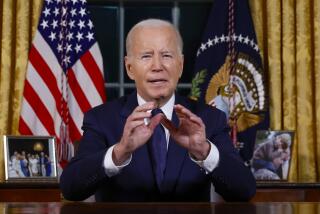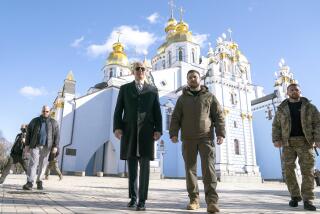With War Over, Good Feelings About Economy May Work in Gore’s Favor
WASHINGTON — Foreign wars usually have political consequences for triumphant leaders--but they do not always produce victory on the domestic battlefield.
Consider the political misfortunes that dogged Woodrow Wilson as his League of Nations failed after World War I, Winston Churchill as he was thrown out of office in Britain after World War II and George Bush as he too was defeated after the 1991 Persian Gulf War.
With the apparent denouement of the Yugoslav campaign, President Clinton has no reason to expect more than a slight upward bump in opinion polls. But for Vice President Al Gore, the war was a political bank shot that could rebound in his favor.
It works like this: Clinton’s popularity has been drifting downward since the start of the war; the number of people telling poll-takers that the country is on the right track has also been slipping. Both trends are attributed to the way the war in the Balkans drew the attention of Americans who might otherwise be focused on the still-booming economy.
Thus, with the distraction of the war removed, potential voters can once again remember that they feel confident about the course the country is taking under the Clinton administration. And that helps Gore in his campaign to succeed Clinton.
Or at least it doesn’t hurt him.
“He has certainly been helped by the Kosovo results. . . . If the war had continued, he’d certainly have been hurt. With it coming to a reasonably successful conclusion, Gore could get a plus, but not a huge plus,” said former Rep. Lee Hamilton, the Indiana Democrat who headed the House International Affairs Committee.
In short, there is a sense that one way or another, the end of the war will benefit Gore, or perhaps former Sen. Bill Bradley if he gains the Democratic presidential nomination.
William Kristol, who headed Dan Quayle’s vice presidential staff and is the editor of the conservative Weekly Standard magazine, said the conflict produced “a pretty real victory”--an assessment that many fellow Republicans are reluctant to give.
“Given the Democrats’ advantage on domestic issues,” he said, “if you were a Republican, you’d want” to have an edge on foreign policy.
Dwight D. Eisenhower found such an edge in 1952, and Bush did in 1988. But they were Republican candidates representing an internationalist wing of the party that few find faring well in its struggle against more isolationist Republican sentiment.
And with the end of the war, conducted by a Democratic administration that largely met the goals it had set out at the start of the conflict, it’s less likely that foreign policy will be a big issue in the 2000 campaign, Kristol said.
Besides, presidential and congressional elections are 17 months away, and unless the nation is in the midst of a divisive conflict or facing a profound national security threat, its election focus will be drawn to economic or social issues.
Although the public likes foreign policy triumphs, said Andrew Kohut, director of the Pew Research Center, “these issues are not the ones that are driving issues.”
John Feehery, spokesman for House Speaker J. Dennis Hastert (R-Ill.), expressed doubt that the end of hostilities will give a significant political boost for the president--or that it will backfire on Republicans.
“It’s been clumsily handled, and there is no clear victory,” he said. But, he added, the settlement will be good for congressional Republicans because “it will give us a chance to go on to other things.”
Republican congressional leaders spent much of the war rhetorically wringing their hands and looking for ways to limit Clinton’s flexibility in prosecuting it, while at the same time generally avoiding any clear record of opposing the war themselves.
Indeed, only hours after the NATO victory was announced, GOP leaders sought Thursday to push through a provision in the $288.8-billion defense appropriations bill that would have cut off money for U.S. peacekeeping operations at the end of the fiscal year, Sept. 30.
The Republicans relented after frenetic negotiations in which the president pledged that he will seek additional appropriations if it proves impossible to finance U.S. peacekeeping efforts in Yugoslavia without hurting military readiness.
But the fact that the administration had to deal with the issue on the very day it was announcing a military victory over Yugoslavia showed the intensity of GOP opposition to Clinton--and the Republicans’ continuing mistrust of the Democratic president.
It also illustrated the extent to which Republicans are conflicted over the Kosovo issue, with many blaming their own leadership for failing to develop a coherent position on the Balkans.
The failure of the Republican leaders in Congress to assert themselves prompted one member of Texas Gov. George W. Bush’s brain trust to say: “What leadership? There ain’t much of it.”
Kenneth M. Duberstein, who served as President Reagan’s chief of staff and has long experience on Capitol Hill, put it more gently: The response to the Yugoslav campaign there, he said, demonstrated that foreign policy is not an area that Congress is particularly good at. “They are all, Republicans and Democrats, risk-averse,” he said, “and this was more difficult than any other conflict.”
*
Times staff writer Marc Lacey contributed to this report.
More to Read
Get the L.A. Times Politics newsletter
Deeply reported insights into legislation, politics and policy from Sacramento, Washington and beyond. In your inbox three times per week.
You may occasionally receive promotional content from the Los Angeles Times.










